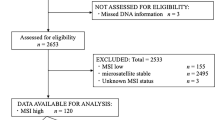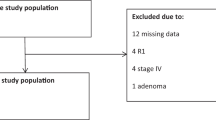Abstract
Purpose
The Bethesda guidelines suggest to perform microsatellite instability (MSI) test in early onset rectal cancer and not in patients >50 years with proximal colon cancer. The aim of the study was to evaluate whether the risk of high MSI (MSI-H) is greater in proximal colon cancer of patients 51–60 years old than in early-onset rectal cancer.
Methods
Consecutive colorectal cancer (CRC) patients were evaluated. Tumor location, cancer family history, MSI status and histology were recorded. Mutations in MLH1/MSH2 were investigated in MSI-H tumors. Patients were subdivided into groups: group A, proximal colon cancer patients 51–60 years old and groups B, C and D, patients ≤50 years old, with rectal cancer, proximal and distal colon cancer, respectively.
Results
Out of 409 CRC patients evaluated, 48 (12%) showed tumors with MSI-H. No MSI-H tumors were found in distal and rectal tumors of patients at sixth decade of life. Group A included 27 patients, eight (29.7%) MSI-H cancers, four missense mutations in MLH1/MSH2; groups B, C and D included 26, 11 and 11 patients with two (7.7%), two (18%) and two (18%) MSI-H cancers, respectively. One missense mutation on MSH2 in group B, one pathogenetic mutation on MSH1 in group C and one pathogenetic mutation on MSH2 in group D were found. Tumors of group A showed an increased probability to have MSI-H if compared to those of group B (OD = 4.907, p = 0.043).
Conclusions
The Bethesda criteria should be broadened to include patients 51–60 years old with proximal colon cancer.

Similar content being viewed by others
References
Herman JG, Umar A, Polyak K, Graff JR, Ahuja N, Issa JP, Markowitz S, Willson JK, Hamilton SR, Kinzler KW, Kane MF, Kolodner RD, Vogelstein B, Kunkel TA, Baylin SB (1998) Incidence and functional consequences of MLH1 promoter hypermethylation in colorectal carcinoma. Proc Natl Acad Sci U S A 95:6870–6875
Vasen HF, Watson P, Mecklin JP, Lynch HT (1999) New clinical criteria for hereditary nonpolyposis colorectal cancer (HNPCC, Lynch syndrome) proposed by the International Collaborative group on HNPCC. Gastroenterology 116:1453–1456
Lindor NM, Rabe K, Petersen GM, Haile R, Casey G, Baron J, Gallinger S, Bapat B, Aronson M, Hopper J, Jass J, LeMarchand L, Grove J, Potter J, Newcomb P, Terdiman JP, Conrad P, Moslein G, Goldberg R, Ziogas A, Anton-Culver H, de Andrade M, Siegmund K, Thibodeau SN, Boardman LA, Seminara D (2005) Lower cancer incidence in Amsterdam-I criteria families without mismatch repair deficiency. JAMA 293:1979–1985
Vasen HFA (2005) Clinical description of the Lynch syndrome (hereditary non polyposis colorectal cancer [HNPCC]). Familial Cancer 4:219–225
Umar A, Boland CR, Terdiman JP, Syngal S, de la Chapelle A, Ruschoff J, Fishel R, Lindor NM, Burgart LJ, Hamelin R, Hamilton SR, Hiatt RA, Jass J, Lindblom A, Lynch HT, Peltomaki P, Ramsey SD, Rodriguez-Bigas MA, Vasen HF, Hawk ET, Barrett JC, Freedman AN, Srivastava S (2004) Revised Bethesda Guidelines for hereditary nonpolyposis colorectal cancer (Lynch syndrome) and microsatellite instability. Natl Cancer Inst 96:261–268
Hampel H, Frankel WL, Martin E, Arnold M, Khanduja K, Kuebler P, Nakagawa H, Sotamaa K, Prior TW, Westman J, Panescu J, Fix D, Lockman J, Comeras I, de la Chapelle A (2005) Screening for the Lynch syndrome (hereditary nonpolyposis colorectal cancer). N Engl J Med 352:1851–1860
Shashidharan M, Smyrk T, Lin KM, Ternent CA, Thorson AG, Blatchford GJ, Christensen MA, Lynch HT (1999) Histologic comparison of hereditary nonpolyposis colorectal cancer associated with MSH2 and MLH1 and colorectal cancer from the general population. Dis Colon Rectum 42:722–726
Park JG, Vasen HF, Park KJ, Peltomaki P, Ponz de Leon M, Rodriguez-Bigas MA, Lubinski J, Beck NE, Bisgaard ML, Miyaki M, Wijnen JT, Baba S, Lynch HT (1999) Suspected hereditary nonpolyposis colorectal cancer: International Collaborative Group on Hereditary Non-Polyposis Colorectal Cancer (ICG-HNPCC) criteria and results of genetic diagnosis. Dis Colon Rectum 42:710–715
Ruo L, Cellini C, La-Calle JP Jr, Murray M, Thaler HT, Quan SH, Guillem JG (2001) Limitations of family cancer history assessment at initial surgical consultation. Dis Colon Rectum 44:98–103
Vasen HF, Möslein G, Alonso A, Bernstein I, Bertario L, Blanco I, Burn J, Capella G, Engel C, Frayling I, Friedl W, Hes FJ, Hodgson S, Mecklin JP, Møller P, Nagengast F, Parc Y, Renkonen-Sinisalo L, Sampson JR, Stormorken A, Wijnen J (2007) Guidelines for the clinical management of Lynch syndrome (hereditary non-polyposis colorectal cancer). J Med Genet 44:353–362
Peterlongo P, Mitra N, de Abajo AS, de la Hoya M, Bassi C, Bertario L, Radice P, Glogowski E, Nafa K, Caldes T, Offit K, Ellis NA (2006) Increased frequency of disease-causing MYH mutations in colon cancer families. Carcinogenesis 27:2243–2249
Qing SH, Rao KY, Jiang HY, Wexner SD (2003) Racial differences in the anatomical distribution of colorectal cancer: a study of differences between American and Chinese patients. World J Gastroenterol 9:721–725
Nelson RL, Dollear T, Freels S, Persky V (1997) The relation of age, race, and gender to the subsite location of colorectal carcinoma. Cancer 80:193–197
Lindblom A (2001) Different mechanisms in the tumourigenesis of proximal and distal colon cancers. Curr Opin Oncol 13:63–69
Acknowledgments
Authors are grateful to Ms. Marina Canapero for her support in checking the linguistic accuracy of the paper, Mr. Ambrosi Alessandro, PhD, for the statistical analysis of the data and Dr. Giuseppe Gagliardi for his review of the manuscript. This work was supported in part by AIRC (Associazione Italiana Ricerca sul Cancro).
Author information
Authors and Affiliations
Corresponding author
Rights and permissions
About this article
Cite this article
Urso, E., Pucciarelli, S., Agostini, M. et al. Proximal colon cancer in patients aged 51–60 years of age should be tested for microsatellites instability. A comment on the Revised Bethesda Guidelines. Int J Colorectal Dis 23, 801–806 (2008). https://doi.org/10.1007/s00384-008-0484-2
Accepted:
Published:
Issue Date:
DOI: https://doi.org/10.1007/s00384-008-0484-2




